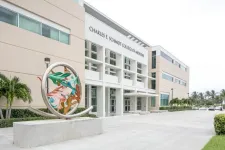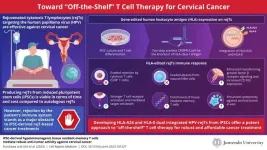(Press-News.org) SAN DIEGO – Funding of field conservation research stations worldwide has been drastically reduced since the beginning of the COVID-19 pandemic, raising the alarm of more than 170 conservation researchers representing 157 field stations in 56 countries in a new paper published in Conservation Letters. The authors contend that field research stations have a high return on investment and are essential and highly effective tools for biodiversity conservation.
Trillions of U.S. dollars were mobilized in economic recovery following the pandemic, yet the authors raise concerns that resources to address biodiversity loss and the climate crises are constrained at a time when they are most urgently needed. The pandemic caused roughly half of the surveyed field stations to close partially, and about one-quarter have remained partially or completely closed, with most field stations seeing a reduction in funding altogether.
Dr. Timothy Eppley, lead author of the paper, Chief Conservation Officer of Wildlife Madagascar, and a former Post Doctoral Research Fellow with San Diego Zoo Wildlife Alliance, said “A fundamental challenge is that governments and other funding agencies aren’t factoring in the true conservation return on investment and don’t realize the critical economic role of ecosystem services being protected by those field stations.”
Eppley and co-authors suggest the work of field research stations is often interdisciplinary, and some of the direct and indirect benefits of the research, education, and public engagement that takes place at field stations have long-term objectives that the current models for cost-benefit analyses do not capture.
“Field stations often function autonomously, with few studies exploring the aggregate impact of their work. Cumulatively, they make a substantial contribution to conservation,” said Eppley.
Dr. Russ Mittermeier, Chief Conservation Officer of Re:wild and senior author on the paper, shared a similar sentiment, saying “Field research stations are a cost-effective and multifaceted tool to addressing global conservation challenges and not just places where esoteric research is conducted, as is often the perception. Almost invariably, one finds higher densities of wildlife in the vicinity of these field stations than in other parts of a particular region, even within protected areas.”
The study consisted of a survey, which focused on field stations in mostly tropical and subtropical countries, to understand the impact of the pandemic on funding and evaluate the conservation benefits of the field stations. Findings include improved habitat quality of the surrounding areas by reducing nearby deforestation, reducing rates of hunting, and improving enforcement of laws regarding wildlife use and resource extraction. Additionally, 93% hire locals, supporting the local economy, in addition to generating significant scientific output that informs conservation policies.
The authors advocate for greater recognition and investment in field research stations. “The benefits of supporting these stations extend beyond preserving biodiversity to advancing scientific research, education, and local community development,” said Mittermeier.
“Our research underscores the critical need for enhanced support for field research stations to ensure their ability to continue their indispensable work. Failing to include field stations in international policy frameworks that address the global biodiversity crisis represents a profound missed opportunity,” said Eppley.
###
About San Diego Zoo Wildlife Alliance
San Diego Zoo Wildlife Alliance, a nonprofit conservation leader, inspires passion for nature and collaboration for a healthier world. The Alliance supports innovative conservation science through global partnerships. Through wildlife care, science expertise and collaboration, more than 44 endangered species have been reintroduced to native habitats. Annually, the Alliance reaches over 1 billion people, in person at the San Diego Zoo and San Diego Zoo Safari Park, and virtually in 150 countries through media channels, including San Diego Zoo Wildlife Explorers television programming in children’s hospitals in 14 countries. Wildlife Allies—members, donors and guests—make success possible.
END
Conservation value of field research stations grossly misunderstood and underfunded according to 173 conservation scientists in new study
2024-03-04
ELSE PRESS RELEASES FROM THIS DATE:
Study underscores social factors of low breast cancer screening in the US
2024-03-04
There is a pressing need to explore and understand which social determinants of health (SDOH) and health inequities act as significant influential factors that contribute to low breast cancer screening behaviors in the United States.
Health disparities have been consistently associated with delayed screening, which then contributes to higher mortality rates among both Hispanic and Black populations. Moreover, poverty, lack of education, neighborhood disadvantage, residential segregation, racial discrimination, lack of social support and social isolation ...
Nanomedicine research aims to transform treatment of aortic aneurysms
2024-03-04
Aortic aneurysms are bulges in the aorta, the largest blood vessel that carries oxygen-rich blood from the heart to the rest of the body. Smoking, high blood pressure, diabetes, or injury can all increase the risk of aneurysms, which tend to occur more often in Caucasian male smokers over the age of 65.
“The soft tissues that make up blood vessels act essentially like rubber bands, and it’s the elastic fibers within these tissues that allow them to stretch and snap back,” says Professor Anand Ramamurthi, chair of the Department of Bioengineering in Lehigh University’s P.C. Rossin College of Engineering ...
HIV medication can be used safely with gender-affirming hormone therapy
2024-03-04
New research definitively shows that HIV antiretrovirals can be taken together with gender-affirming hormone therapy without changing how well either drug works. The study findings can help healthcare providers address potential patient concerns that one drug will counteract the other.
“This study is the first head-to-head pharmacokinetic analysis of two common HIV medications and long-term feminizing hormone therapy use,” says Walter Kraft, MD, director of the Division of Clinical ...
Gene-edited lymphocytes and the path toward ‘off-the-shelf’ therapy against cervical cancer
2024-03-04
Cervical cancer is among the most common malignancies affecting women worldwide. In 2020 alone, approximately 600,000 women were diagnosed with this disease, and over 314,000 died from it. In 99% of the cases, cervical cancer cells harbor human papilloma virus (HPV), and thus, HPV vaccines are an effective way to mitigate the risk of developing this disease. Unfortunately, such preventive measures are useless against established cancers, which are generally incurable once they become metastatic or relapsing.
Fortunately, scientists have made substantial progress in developing a promising ...
Humans have driven the Earth’s freshwater cycle out of its stable state
2024-03-04
A new analysis of freshwater resources across the globe shows that human activity has pushed variation in the planet’s freshwater cycle well outside of its pre-industrial range. The study shows that the updated planetary boundary for freshwater change was surpassed by the mid-twentieth century. In other words, for the past century, humans have been pushing the Earth’s freshwater system far beyond the stable conditions that prevailed before industrialization.
This is the first time that global water cycle change has been assessed over such a long timescale with an appropriate reference baseline. The findings, published in Nature Water, show that human ...
Exposure to different kinds of music influences how the brain interprets rhythm
2024-03-04
CAMBRIDGE, MA -- When listening to music, the human brain appears to be biased toward hearing and producing rhythms composed of simple integer ratios — for example, a series of four beats separated by equal time intervals (forming a 1:1:1 ratio).
However, the favored ratios can vary greatly between different societies, according to a large-scale study led by researchers at MIT and the Max Planck Institute for Empirical Aesthetics and carried out in 15 countries. The study included 39 groups of participants, many of whom came from societies ...
Study shows differences in how patients with impulse control disorder process consequences
2024-03-04
WINSTON-SALEM, N.C. – March 4, 2024 – Parkinson’s disease is a neurological disorder that affects movement and muscle control. One characteristic of the disease is the deficiency of dopamine, a neurotransmitter or brain chemical that plays a role in movement and can impact how people think and feel.
Dopaminergic medicines can help alleviate the symptoms of Parkinson’s disease. However, in some patients, the medications can cause impulse control disorder (ICD), characterized by risky behavior such as excessive gambling, shopping, ...
Improving access to early-stage lung cancer care in Europe
2024-03-04
There are stark differences between European countries when it comes to both the reimbursement of, and access to, new treatments for patients with early-stage lung cancer. There are also differences in reimbursement times and indications between the European Medicines Agency (EMA) and the US Food and Drug Administration (FDA). Researchers from Amsterdam UMC Cancer Center Amsterdam analysed the landscape, and their results are published today in The Lancet Regional Health Europe as part of a series on the latest developments in the treatment of this lung cancer.
"Tackling inequalities in access to care must be a common European priority," ...
Low iron levels resulting from infection could be key trigger of long COVID
2024-03-04
Problems with iron levels in the blood and the body’s ability to regulate this important nutrient as a result of SARS-CoV-2 infection could be a key trigger for long COVID, new research has discovered.
The discovery not only points to possible ways to prevent or treat the condition, but could help explain why symptoms similar to those of long COVID are also commonly seen in a number of post-viral conditions and chronic inflammation.
Although estimates are highly variable, as many as three in 10 people infected with SARS-CoV-2 could go on to develop long COVID, with symptoms including fatigue, ...
Swapping meat for Quorn lowers bad cholesterol by 10-percent
2024-03-04
Regularly substituting meat for mycoprotein such as Quorn could help to lower bad cholesterol by 10-percent, which is comparable to switching to a Mediterranean or vegan diet.
New research by the University of Exeter, published in Clinical Nutrition, also found substituting meat for Quorn reduces blood glucose and c-peptide concentrations associated with diabetes, cardiovascular disease and all-cause mortality.
With one in six UK adults suffering from raised cholesterol, the findings indicate that mycoprotein - the high protein, high-fibre food source that’s the main ingredient in Quorn - could play a key role in ...



